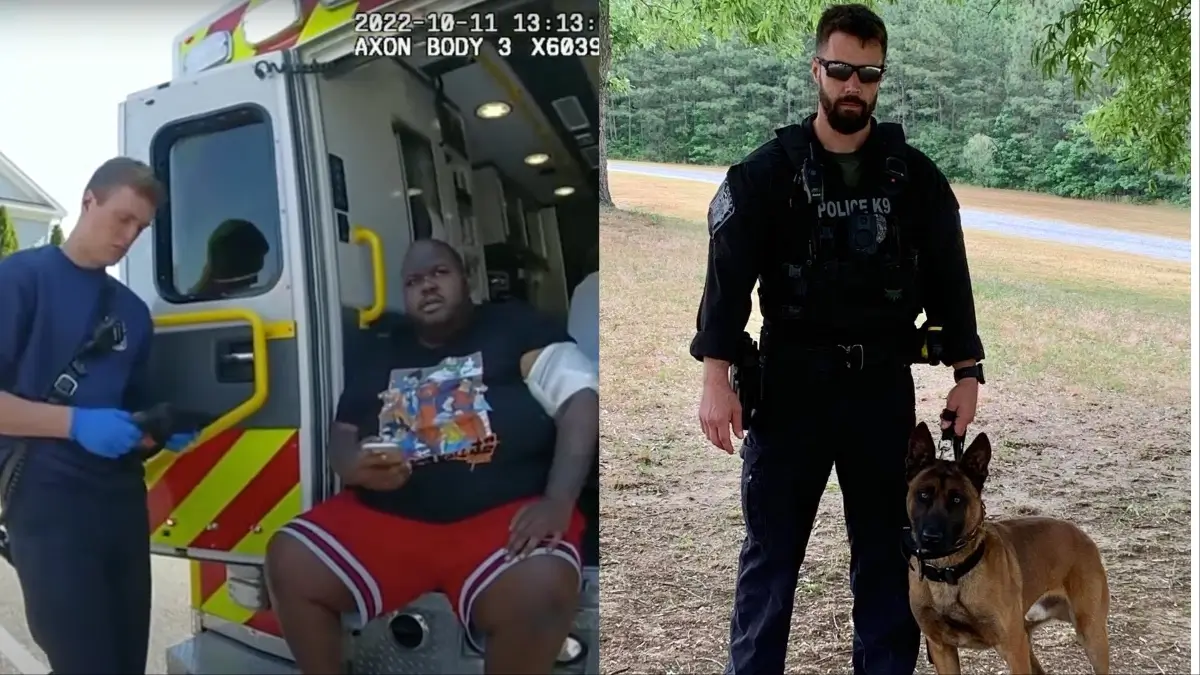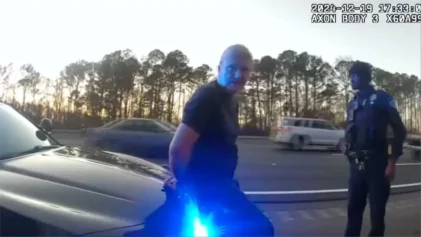A Black man who was bitten by a police canine after being mistaken for an intruder in his uncle’s apartment is suing the Chesterfield, Virginia, police officer who sicced the dog on him for $2.5 million, claiming the attack was an excessive use of force.
In his federal lawsuit, Derrick Williams says he was asleep in a bedroom of the River Forest Apartments on Oct. 11, 2022, when he heard the front door being kicked in and someone stomping around, then a woman’s voice cursing and telling him she had a gun. He said he didn’t recognize the voice. The woman left, and he went back to sleep.
Williams, 36, who lives in New York, said he had been staying in the apartment for a few weeks. His uncle, Tyleek Harris, had given him a key after his uncle’s ex-girlfriend, Kara Kennedy, had moved out in early September.

Williams says he was jarred awake again a short time later by the commands of Chesterfield Police Officer Cpl. Gordon Painter, who ordered him to come out of the bedroom.
Williams says he complied and was stepping into the hallway with his hands in the air when he was immediately attacked by the police dog, which bit and locked onto his upper arm. The dog didn’t release its grip even after officers rushed forward and handcuffed him.
“It’s biting me, it’s biting me, for no reason. Oh my God, Oh my God,” Williams can be heard plaintively yelling on police bodycam video.
“It felt like being stabbed,” Williams later told CBS 6 News in Richmond.
On the video, Painter said, “Get off, let go,” and then pulled the canine away from Williams.
Williams was treated on the scene by EMS, who then took him to the hospital, where he received stitches for several lacerations on his left triceps, according to police records.
Before the police released him, bodycam video shows that an officer informed Williams, “You’re good to go. You’re not detained, in custody, nothing. We’re sorry you got bit by a dog.”
“Charge it to the game. At least I’m alive,” Williams responded.
The investigating officer is then heard suggesting the bite should not have happened, reported CBS 6.
“Can you imagine getting bit by a dog and you shouldn’t have?” the officer said.
As it turned out, the woman who had broken into the apartment earlier was Kennedy, who had come to collect her belongings. When she saw Williams lying in her bed, naked and wrapped in a blanket, she ran out of the apartment screaming and called 911, reporting a break-in.
Kennedy told the police dispatcher that a Black man she didn’t know was in her apartment, that she was the only person whose name was on the lease, and that no one else should be in there or have a key. She said she’d forgotten her key and had swung by the leasing office to pick up a spare but found the door to the apartment chained when she tried to open it. So she had kicked it open.
In his legal responses to Williams, Painter argues that he and the other 13 officers involved were responding to a reported breaking and entering and possible burglary in progress, the latter a violent offense that could justify the use of a K-9 and other lethal force.
When they arrived, officers surrounded the building, guarding the exits, while Painter stood at the threshold of the front door barking commands. At least one officer stood by him at the ready with a gun to provide cover.
On the bodycam video, Painter first said, “Police canine. Speak to me now. I’ll release the dog. Dog finds you, you’ll be bit.” Then he released his K-9, Scout, who searched around the kitchen for several seconds before Painter called him back.
“Come out now,” Painter said, then waited 26 seconds before releasing the dog, saying, “Find him.” The dog then ran down the hallway, found and bit Williams.
In his amended complaint, filed in U.S. District Court for the Eastern District of Virginia in December, Williams claims that Painter illegally used deadly force against him despite the fact that he had committed no crime, never posed a threat of safety to him or any of the officers, and never resisted arrest or attempted to flee.
He says Painter violated his federal rights against the use of excessive force and committed assault and battery against him in violation of state law.
“The Federal Courts have held that using a dog to bite and hold a suspect who posed no immediate threat constitutes excessive force,” the complaint states, noting that the crime that Painter was investigating was “at most … a trespass, of which there was none. The only report was a man asleep in bed. There was no rush to the situation. There was plenty of time to use other means to make a timely apprehension of a suspect.”
“Defendant Painter knew nothing of who was inside the apartment or the situation and blindly and unlawfully released his canine, akin to blindly shooting into an occupied apartment without knowing who is present,” the complaint contends.
A police report revealed that after the dog bite incident, police interviewed a person working in the leasing office, who said that Kennedy had come in earlier on the day of the incident to request a key and told them that “my ex-boyfriend moved somebody into my house,” and that she wanted their help getting him out, which they declined.
Police also learned that Harris, Williams’s uncle, had been paying the rent on the apartment for over a year.
The report says that a prosecutor advised the investigating officer that Williams could not be charged with breaking and entering but that Kennedy could be charged with “false summoning,” pending further investigation.
Bodycam video captured Chesterfield police discussing those details that came to light after the incident, reported CBS 6 News.
“The female actually spoke to the leasing office and stated she knew her ex-boyfriend was letting someone move in, but she did not portray that to us at all,” the investigating officer said during a call with Rhanelle Collins-Meredith, the county prosecutor.
Other officers can be heard discussing whether Williams was legally allowed to be in the apartment due to establishing residency.
“We’re in a position where, a sticky situation, right? Because we let a dog in. He’s been bit by a dog, and he’s under the assumption he’s allowed to be here, and we act on the information that—” an officer said.
“We were given,” another officer replied.
In his efforts to dismiss the lawsuit, Painter claims he is protected from liability in the case due to laws providing qualified immunity for police officers whose conduct is “objectively reasonable” under the circumstances and given the facts known to them at the time.
“Corporal Painter’s use of K-9 Scout to seize an intruder who had reportedly broken into the complainant’s home, was still hiding in the apartment, and did not comply with numerous police warnings and commands that K-9 would be released to bite was objectively reasonable under the law,” a memo filed by the defendant in December argued.
Painter asserts that Williams didn’t comply with “four loud and clear warnings and gave no audible response to indicate an intent to surrender” and didn’t physically submit to his commands “until the last second before he was bitten.”
In their response to the defendant’s motion to dismiss, Williams’ attorneys counter that Painter gave Williams no opportunity to respond, noting that “it was 33 seconds from the time Defendant Painter released the K-9 to Mr. Williams getting bit, 33 seconds! How is it objectively reasonable to allow someone to react from a back bedroom in that time? That is a question for the jury.”
The plaintiff also faults Painter and other officers for not vetting the misleading information about “the naked Black man” in the apartment reported to police by Kennedy before they confronted him.
But county attorneys argue that legal precedent establishes that “the Court may not employ the 20/20 vision of hindsight.”
“Each of the officers on scene perceived the suspect to be an immediate threat to their safety and the safety of other people in the apartment complex,” they claim. “There were so many unknowns for the officers, an objectively reasonable officer would conclude the suspect had a distinct advantage — an ability to prepare, hide or ambush — and waiting for K-9 Scout to be deployed allowed the officers to make a safer entry into the apartment.”
The defendant’s attorneys further argue that the police officers couldn’t confirm whether the suspect was armed or unarmed “until he was within arms’ reach so they could perform a pat down” or until “the suspect followed commands to show himself and put his hands up, commands which the suspect admittedly heard but did not follow until after the K-9 had been deployed and was biting the suspect.”
William’s attorney, Phillip Georges, told CBS 6 that Chesterfield police violated federal standards for use of excessive force as well as their own department policy, which states that physical canine contact can be “a significant use of force and shall be done only in relatively serious situations and where lesser means of force are not available or reasonably practical.”
“There is no right or authority for that officer to have released the canine at all. He could have it on a leash to help him search, but he must contain control of that animal at all times,” said Georges. “There are so many problems with how the police handled themselves in this case. Excessive force was used when no crime was ever committed.”
The complaint also cites other claims of excessive force against Officer Painter, including a settled case involving a 2019 traffic stop in which video shows Painter punching a driver and an active case involving the deadly 2023 shooting of Charles Byers, a mentally ill man,CBS 6 reported.
Records show Painter’s unleashed canine also bit a woman earlier in 2022 while she was walking along a nature trail with her dog near the police academy. The woman’s lawyers sent a demand letter to Chesterfield County alleging Painter “failed to maintain control of his dangerous animal.” The county sent a $100,000 check to the woman’s lawyers.
Williams claims his injuries were severe and permanent, causing nerve damage and scarring. He also suffered conscious pain and suffering, economic loss, humiliation and mental distress as a result of the dog attack and alleged unlawful arrest, his complaint says. He seeks a jury trial and a judgment to award the costs of litigation, compensatory and special damages in the amount of $500,000 and punitive damages of $2 million.
U.S. District Judge Robert Payne, who has not yet ruled on the defendant’s motion to dismiss, issued a scheduling order on Jan. 2 that gave counsel for both parties 50 days to meet in person with the judge to discuss a settlement and to present “a cogent, brief summary of the issues of liability and damages.”


